八年级3
英语八年级上册Unit3语法课件
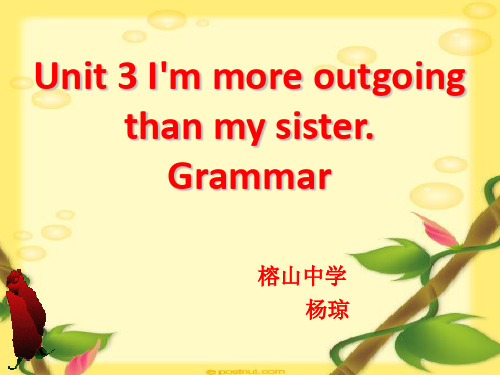
B. more beautiful
C. beautifully D. more beautifully
1.read the sentences in Grammar Focus
2.finish the exercise 3a&3b on your book(P19)
Summary
Thanks!
形容词比较级的概念
Gao Yuanyuan is as _b_e_a_u_t_if_u_l (漂亮) as Sun Li. Sun Li works as _h_a_r_d_ (努力) as Gao Yuanyuan.
补充句式
3. “比较级 + and + 比较级”,这是表示“越来 越……”。 越来越好 better and better 越来越冷 colder and colder
late
later
Read after me
late——later nice——nicer
aeiou
元音字母
hot
辅+元+辅
hotter
以一个辅音字母+一个元音字母+一个辅音字母结尾的 重读闭音节形容词,双写最后一个辅音字母再加er
Read after me
big—bigger fat—fatter
taller bigger heavier later more interesting
thin early fast quickly hard
thinner earlier faster more quickly
harder
1. 两者进行比较,表示“一方比另一方更……”
1) A+ be+ 形容词比较级+ than+ B 如:我比我妹妹高。 I am taller than my sister.
八年级(3)班班风:

八年级期中段考,前20名排列名单
2012—2013 学年度第一学期(八年级)期中考试成绩
座号 姓 名 语文 数学 英语 物理 政治 历史 生物 地理 总分 年级名次
83
8304 史蕊萍
91
86
100
91
72
90
613
11
8323 李志英
81
66
75
77
75
78
74
82
608
12
8326 冉胜男
83
47
64
86
88
62
84
94
608
12
8346 任轹文
79
70
67
86
85
75
73
72
607
14
8317 许文珊
80
44
92
66
89
77
72
86
606
15
8336 王慧婉
83
53
67
64
87
87
70
92
603
86
84
95
705
1
表 ห้องสมุดไป่ตู้339 吴妙娟
95
65
91
72
84
82
68
88
645
2
示 8315 李淑玲
85
60
90
80
87
73
74
93
642
3
八 8103 苏运芯
86
68
八年级第3期英语周报(GZ)参考答案解析

八年级第3期 第2-4版
第三节One possible version: Last Friday, we went to visit
Guangzhou Museum on our school bus. It is in Yuexiu Park and it has a history of over 80 years. In the museum we saw a lot of historical pictures and objects, such as cannons of the Qing Dynasty and precious
八年级第3期 第2-4版
tablets. The tablets are made of stone. After visiting the museum, I had a greater understanding of Guangzhou, including its history and its culture. I am proud of Guangzhou. I will try to make it a better place.
八年级牛津第3期 参考答案
《共同关注》 1-2 FT
八年级第3期 第1版
Unit 1单元综合能力检测题
笔试部分
一、1-5 Hale Waihona Puke DBAC6-10ADCBC
11-15 DABCA
二、16-20ACDBC 21-25 CCDAB
八年级第3期 第2-4版
三、第一节 26-30 BBADD 36-40 CADCD 第二节 46-50 ECBAD
八年级第3期 第2-4版
知识回顾 Knowledge Review
英语八年级上Unit3重点短语和句子

英语八上Unit 3重点短语和句子(1)短语:1.一个外向的男孩儿2.…和…都3.他们都4.更喜欢某物5.更擅长6.保持安静7.赢得一等奖/诺贝尔奖8.赢得网球赛9.在…方面有天赋10.一位有才华的艺术家11.才艺秀12.真人真事13.跟我说实话14.在意,关心15.照顾16.当心17.嘲笑某人18.对…认真严肃执着19.一场严重的车祸20.认真对待…21.照镜子22.只要23.与…不同24.和…相同25.看起来一样26.把某人最好的一面显现出来27.取得好成绩28.到达某地29.上交/分发30.帮某人忙31.越多…越好…32.和某人保持联系33.失去信心34.越来越大/漂亮35.事实上36.和某人分享某物37.与…类似38.小学39.在英语方面有好成绩40.一条信息句子:1.我是两个游客中更高的。
'2. 2.山姆有着比汤姆更长的头发。
山姆的头发比汤姆长。
3.蒂娜唱的比塔拉更大声/清晰/优美。
4.这位印度商人跟这位中因农民工作一样努力。
5.留着更短头发的女孩儿是我姐姐。
4. 6.不过,你可以看出丽萨真的想赢.7.所有人都想昨天的唱歌比赛。
8.最重要的事情是学到新的东西并玩的愉快。
9.你的地理老师比你的数学老师聪明吗?不。
英语八上Unit 3重点短语和句子(2)10.你和你弟弟一样友好吗?不。
11.这位歌星和这位钢琴家一样努力工作吗?是的。
12谁在学校更勤奋?13.我的好朋友认为他比我学习努力。
14.我现在比三年前高得多。
15.这位有才华的艺术家在音乐方面有天赋。
16.朱莉喜欢做和我一样的事情。
17.你父母真的关心你。
18.王老师总是在他的英语课上使我们大笑。
19.穿蓝衣服的男孩是好的倾听者。
20.好朋友像镜子。
21.我比大多数孩子安静和严肃。
22.那就是为什么他练习下国际象棋。
23对于我来说交朋友不容易。
24.玛丽不如凯特擅长网球。
25.朋友贵在精不在多。
26没必要一样。
27.我和拉里都喜欢在周末做运动。
人教版八年级英语unit3教案

Unit 3 I’m more outgoing than my sister.Period 1 (Section A 1a-2d)Teaching Aims:1. Words:outgoing,better, loudly, quietly, hard-working, competition, fantastic, which, clearly, win, thoughLanguage objects:That’s Tara, isn’t it?Sam has longer hair than Tom .Both Sam and Tom can play the drums, but Sam plays them better than Tom. Tara works as hard as Tina.2. Ability objects:To talk about personal traits and compare people; to improve Ss’ speaking, listening and writing skills.To grasp the structure of comparatives, e.g. comparatives with –(i)er and more, both and as...as...; to grasp the structure: A+谓语+比较级(adj./adv.)+than+B, A+谓语+as+原级(adj./adv.)+as+B.To recycl e vocabulary about description3. Moral objects: To find strengths of somebody else, to explore the beauty of the world.Teaching important and difficult points:1. To talk about personal traits ; to grasp how to compare people.2. To use target language: A+谓语+比较级(adj./adv.)+than+B, A+谓语+as+原级(adj./adv.)+as+B, comparatives with –(i)er and more.3. To improve the students’ listening, speaking and writing skills; to develop their communicative competence.Teaching Procedures:Step 1 Leading-in.To show some pictures to recycle adj. based on some types, and learn some new words.Step 2 1a1. Learn new words:outgoing,better loudly quietly which competition fantastic hard-working clearly win funny friendly smart lazy2 . Look at the picture in 1a and make a list of the adjectives.Purpose: to make the students recall some adjectives they have learned before;3. To make the students compare two persons or two things with the above adjectives and adverbs; to summarize the pattern of comparative degree.“A+谓语+比较级(adj./adv.)+than+B”4. To show the map of Anhui Province to guide the students to compare Fuyang and Wuhu in size, climate, slight spots and so on.Purpose: to practice comparatives; to show the structure of “A+谓语+as+原级(adj./adv.)+as+B” and compl ete emotional aims.Step 4.Listen and write .1b Listen again for the students to listen and fill in the chart.Check the answers with the classStep 3 Practice.1c. Pair work: Compare two persons.Purpose: to make the stud ents practice the patterns of comparative degree. Step 4. Listening1. 2a Listen and change the adjectives into comparatives by -er/-ier/or more.2. 2b Listen again. Match the activities with how often Cheng Tao does them. Step 5. Pair work:2c Fill in the chart first and then make conversations in pairs.Step 6. Role-play the conversations2d Let the students read the chart and find out the differences between Sam and Tom.Explain the comparatives of the adjectives1) smart-smarter2) funny-funnier3) hardworking-more hardworking3.Let the students h ave five minutes for the students to recite the statements.4.Role-play the conversation in pairs.Step 7 To sum up.To make the students summarize what they have learned in this class.Step 8. Homework.1. Preview 2d2. Writing: The person I respect.Blackboard designUnit 3 I’m more outgoin g than my sister.Unit 3 I’m more outgoing t han my sister.Period 2 (Grammar Focus-3c) Teaching Aims:1.Key structure:Is Tom smarter than Sam?Is Tina more outgoing than Tina?Are you as friendly as your sister?Does Tina work as hard as Tara?Who’s more hard-working at school?2. Ability aims:Students can use the Comparison of adjectives to compare different persons. 3. Emotional aims:Everyone may has own opinion, different people have different ideas. Teaching important points:(1)To learn how to add –er/-ier/more … after adjectives/adverbs.(2)To learn : S + be + adj./adv.比较级+than+被比较对象S + have/has +adj./adv.比较级+n.+ than+被比较对象(3)To learn: Who+be+adj. 比较级+…?Teaching difficult points:(1) To learn Which/who sentences.The students can und erstand and write a short passage between two persons. Teaching procedures:Step1 Revision写出下面形容词的比较级形式white young funny red west cloudygreen windy happy blue curly busyyellow straight sorry big tall scarysmall hot w arm short cold strictlong coo c heap terrible fantastic colorfulsuccessful unfriendly t ired surpriseddelicious relaxed international expensive sunnyStep 2 Grammar FocusLet the students read the sentences in the box and make sure they und erstandthem. Pay attention to the use of the foll owing sentences:Is Tom smarter than Sam?Is Tina more outgoing than Tina?Are you as friendly as your sister?Does Tina work as hard as Tara?Who’s more hard-working at school?要点总结形容词在句中常作表语和定语,也可补充说明宾语;副词的句中主要作状语。
人教版日语八年级 第3课 日汉汉日 练习题(含答案)

人教版八年级日语第3课日汉汉日练习题。
包括填空题和选择题前面是题,后面是答案。
(1)いう◎______________________(2)みじかい③______________________(3)あつい◎______________________(4)あたまがいい______________________(5)はつおん◎______________________(6)あそぶ◎______________________(7)まるい◎______________________(8)インコ①______________________(9)ながい②______________________(10)とまる◎______________________(11)ほしい②______________________(12)びっくり③______________________(13)はなす②______________________(14)インイン①______________________(15)ふとい②______________________(16)なまえ◎______________________(17)つめたい◎______________________(18)ペット①______________________(19)あいさつ①______________________(20)ほそい②______________________(21)うすい◎______________________(22)クラスメート④______________________(23)しかくい③______________________(24)さいご①______________________(25)とぶ◎______________________(26)はっきり③______________________(27)こんな◎______________________(1)(动1他)说(2)(形1)短,短暂(3)(形1)厚(4)(词组)聪明(5)(名)发音(6)(动1自)玩(7)(形1)圆(的)(8)(名)鹦哥,鹦鹉(9)(形1)长,长久(10)(动1自)停止(11)(形1)想要(12)(副·动3自)吃惊(13)(动1他)讲述,交谈(14)()茵茵(鸟名)(15)(形1)粗(16)(名)名字,姓名(17)(形1)冷,冷淡(18)(名)宠物(19)(名动3自)寒暄,问候(20)(形1)细,瘦小(21)(形1)薄,淡(22)(名)同班同学(23)(名)四边形(24)(名)最后(25)(动1自)飞,飞行(26)(副)清楚,明确(27)(连体)这样的( )1.いう◎A. (名)鹦哥,鹦鹉B. (名)名字,姓名C. (动1他)说D. (动1自)玩( )2.みじかい③A. (形1)短,短暂B. (动1他)说C. (形1)长,长久D. (副·动3自)吃惊( )3.あつい◎A. (名)最后B. (动1自)玩C. (动1自)飞,飞行D. (形1)厚( )4.あたまがいいA. (副·动3自)吃惊B. (词组)聪明C. (连体)这样的D. (形1)细,瘦小( )5.はつおん◎A. (形1)冷,冷淡B. (词组)聪明C. (形1)粗D. (名)发音( )6.あそぶ◎A. (形1)薄,淡B. (词组)聪明C. (形1)圆(的)D. (动1自)玩( )7.まるい◎A. (动1自)停止B. (形1)薄,淡C. (词组)聪明D. (形1)圆(的)( )8.インコ①A. (名)鹦哥,鹦鹉B. (形1)薄,淡C. (形1)厚D. (形1)想要( )9.ながい②A. (形1)细,瘦小B. (形1)长,长久C. (形1)冷,冷淡D. (形1)薄,淡( )10.とまる◎B. (名动3自)寒暄,问候C. (副·动3自)吃惊D. (动1自)停止( )11.ほしい②A. (名)同班同学B. (动1自)飞,飞行C. (词组)聪明D. (形1)想要( )12.びっくり③A. (动1自)玩B. (副·动3自)吃惊C. (动1他)说D. (词组)聪明( )13.はなす②A. (动1他)讲述,交谈B. (动1自)玩C. (名)鹦哥,鹦鹉D. (名)宠物( )14.インイン①A. (形1)冷,冷淡B. ()茵茵(鸟名)C. (名)同班同学D. (副·动3自)吃惊( )15.ふとい②A. (动1他)讲述,交谈B. (词组)聪明C. (形1)粗D. (名)最后( )16.なまえ◎A. (连体)这样的B. (名)名字,姓名C. (形1)薄,淡D. (副·动3自)吃惊( )17.つめたい◎A. (名)四边形B. (名)鹦哥,鹦鹉C. (形1)冷,冷淡D. (名动3自)寒暄,问候( )18.ペット①A. (形1)圆(的)B. (名)宠物C. (动1自)玩D. (形1)长,长久( )19.あいさつ①A. (动1自)飞,飞行B. (名动3自)寒暄,问候C. (名)同班同学D. (动1自)玩( )20.ほそい②A. (动1自)玩C. ()茵茵(鸟名)D. (名)鹦哥,鹦鹉( )21.うすい◎A. (形1)短,短暂B. (形1)薄,淡C. (名)名字,姓名D. (动1他)讲述,交谈( )22.クラスメート④A. (形1)冷,冷淡B. (形1)长,长久C. (名)宠物D. (名)同班同学( )23.しかくい③A. (形1)长,长久B. (形1)短,短暂C. (副·动3自)吃惊D. (名)四边形( )24.さいご①A. (名)发音B. (形1)薄,淡C. (名)四边形D. (名)最后( )25.とぶ◎A. (形1)细,瘦小B. (名)鹦哥,鹦鹉C. (动1自)飞,飞行D. (动1自)玩( )26.はっきり③A. (名)最后B. (副)清楚,明确C. (名)四边形D. (名动3自)寒暄,问候( )27.こんな◎A. (连体)这样的B. (副·动3自)吃惊C. (动1他)说D. (副)清楚,明确1.C2.A3.D4.B5.D6.D7.D8.A9.B10.D11.D12.B13.A14.B15.C16.B17.C18.B19.B20.B21.B22.D23.D24.D25.C26.B27.A(1)(形1)细,瘦小______________________(2)(形1)薄,淡______________________(3)(形1)短,短暂______________________(4)()茵茵(鸟名)______________________(5)(名)最后______________________(6)(形1)粗______________________(7)(名)发音______________________(8)(名)四边形______________________(9)(动1他)讲述,交谈______________________(10)(连体)这样的______________________(11)(词组)聪明______________________(12)(动1自)停止______________________(13)(形1)冷,冷淡______________________(14)(副·动3自)吃惊______________________(15)(名)同班同学______________________(16)(形1)圆(的)______________________(17)(动1他)说______________________(18)(形1)长,长久______________________(19)(名)鹦哥,鹦鹉______________________(20)(形1)厚______________________(21)(副)清楚,明确______________________(22)(动1自)飞,飞行______________________(23)(名)宠物______________________(24)(名)名字,姓名______________________(25)(名动3自)寒暄,问候______________________(26)(动1自)玩______________________(27)(形1)想要______________________(1)ほそい②(2)うすい◎(3)みじかい③(4)インイン①(5)さいご①(6)ふとい②(7)はつおん◎(8)しかくい③(9)はなす②(10)こんな◎(11)あたまがいい(12)とまる◎(13)つめたい◎(14)びっくり③(15)クラスメート④(16)まるい◎(17)いう◎(18)ながい②(19)インコ①(20)あつい◎(21)はっきり③(22)とぶ◎(23)ペット①(24)なまえ◎(25)あいさつ①(26)あそぶ◎(27)ほしい②( )1.(形1)细,瘦小A. ほそい②B. あたまがいいC. はっきり③D. いう◎( )2.(形1)薄,淡A. あいさつ①B. さいご①C. うすい◎D. はっきり③( )3.(形1)短,短暂A. みじかい③B. あそぶ◎C. うすい◎D. あいさつ①( )4.()茵茵(鸟名)A. あつい◎B. ふとい②C. インイン①D. クラスメート④( )5.(名)最后A. びっくり③B. クラスメート④C. さいご①D. ほそい②( )6.(形1)粗A. あいさつ①B. しかくい③C. ふとい②D. はなす②( )7.(名)发音A. はなす②B. ペット①C. はつおん◎D. はっきり③( )8.(名)四边形B. クラスメート④C. びっくり③D. しかくい③( )9.(动1他)讲述,交谈A. はなす②B. なまえ◎C. あそぶ◎D. とまる◎( )10.(连体)这样的A. みじかい③B. こんな◎C. あたまがいいD. インイン①( )11.(词组)聪明A. まるい◎B. とぶ◎C. なまえ◎D. あたまがいい( )12.(动1自)停止A. なまえ◎B. こんな◎C. とまる◎D. とぶ◎( )13.(形1)冷,冷淡A. インイン①B. つめたい◎C. インコ①D. なまえ◎( )14.(副·动3自)吃惊A. びっくり③B. さいご①C. いう◎D. ほしい②( )15.(名)同班同学A. クラスメート④B. はつおん◎C. あたまがいいD. こんな◎( )16.(形1)圆(的)A. まるい◎B. こんな◎C. びっくり③D. あそぶ◎( )17.(动1他)说A. あいさつ①B. ペット①C. とまる◎D. いう◎( )18.(形1)长,长久A. うすい◎C. いう◎D. ながい②( )19.(名)鹦哥,鹦鹉A. あつい◎B. あたまがいいC. インコ①D. びっくり③( )20.(形1)厚A. びっくり③B. つめたい◎C. あつい◎D. ペット①( )21.(副)清楚,明确A. はっきり③B. あつい◎C. びっくり③D. うすい◎( )22.(动1自)飞,飞行A. いう◎B. とぶ◎C. あたまがいいD. みじかい③( )23.(名)宠物A. インイン①B. ペット①C. まるい◎D. びっくり③( )24.(名)名字,姓名A. つめたい◎B. なまえ◎C. びっくり③D. クラスメート④( )25.(名动3自)寒暄,问候A. つめたい◎B. あいさつ①C. ふとい②D. うすい◎( )26.(动1自)玩A. しかくい③B. ながい②C. あそぶ◎D. ペット①( )27.(形1)想要A. はつおん◎B. まるい◎C. ほしい②D. インコ①1.A2.C3.A4.C5.C6.C7.C8.D9.A10.B11.D12.C13.B14.A15.A16.A17.D18.D19.C20.C21.A22.B23.B24.B25.B26.C27.C。
人教版八年级上册3单元单词(附音标)

1
outgoing
['a?tɡ????]
adj.爱交际的;友好的;外向的
2
better
['bet?(r)]
adj.& adv.更好的;较好的(good和well的比较级)
3
loudly
['la?dli]
adv.喧闹地;大声地;响亮地
4
quietly
['kwa??tli]
adv.轻声地;轻柔地;安静地
truly
['tru?li]
adv.真实;确实
14
care
[ke?]
v.在意;担忧;关心
15
care about
关心;在意
16
serious
[ 's??ri?s]
adj.严肃的;稳重的
17
mirror
['m?r?(r)]
n.镜子
18
kid
[k?d]
n.小孩,年轻人
19
as long as
只要;既然
20
5
hard-working
[?hɑ:(r)d 'w?:(r)k??]
adj.辛勤的;工作努力的
6
competition
[?k?mp?'t??n]
n.比赛;竞赛;竞争
7
fantastic
[f?n't?st?k]
adj.极好的;了不起的
8
which
[w?t?]
pron.& adj.哪一个;哪一些
9
clearly
39
similar
['s?m?l?(r)]
冀教版八年级上册Unit3重点单词汇总
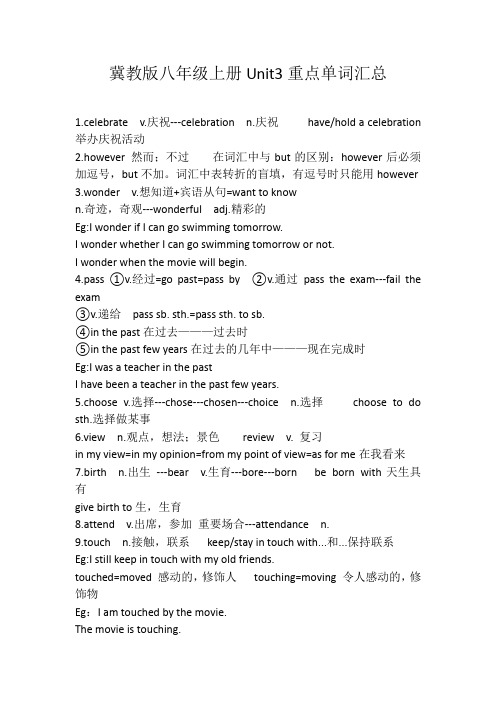
冀教版八年级上册Unit3重点单词汇总1.celebrate v.庆祝---celebration n.庆祝have/hold a celebration 举办庆祝活动2.however 然而;不过在词汇中与but的区别:however后必须加逗号,but不加。
词汇中表转折的盲填,有逗号时只能用however3.wonder v.想知道+宾语从句=want to known.奇迹,奇观---wonderful adj.精彩的Eg:I wonder if I can go swimming tomorrow.I wonder whether I can go swimming tomorrow or not.I wonder when the movie will begin.4.pass ①v.经过=go past=pass by ②v.通过pass the exam---fail the exam③v.递给pass sb. sth.=pass sth. to sb.④in the past在过去———过去时⑤in the past few years在过去的几年中———现在完成时Eg:I was a teacher in the pastI have been a teacher in the past few years.5.choose v.选择---chose---chosen---choice n.选择choose to do sth.选择做某事6.view n.观点,想法;景色review v. 复习in my view=in my opinion=from my point of view=as for me在我看来7.birth n.出生---bear v.生育---bore---born be born with天生具有give birth to生,生育8.attend v.出席,参加重要场合---attendance n.9.touch n.接触,联系keep/stay in touch with...和...保持联系Eg:I still keep in touch with my old friends.touched=moved 感动的,修饰人touching=moving 令人感动的,修饰物Eg:I am touched by the movie.The movie is touching.10.fit v.合适,合身---fit---fit---fitness n.健康,适合fit sb.适合某人Eg:The dress fits me well.adj.适合的;健康的be fit for适合,胜任eg:I am fit for the job.Keep/stay fit保持健康=keep/stay healthy11.hug v.拥抱---hugged---hugged---hugging hug sb.=give sb. a hug12.post v.邮寄post sb. sth.=post sth. to sb.post office邮局postcard 明信片postman邮递员poster海报13.in fashion时尚的out of fashion过时的14.deep adj.深的---deeply adv.深深地---depth n.深度take a deep breath深呼吸15.blow---blew---blown blow out。
人教版八年级下Unit3知识点总结和习题(部分答案)

八年级下Unit 3知识清单Section A一、短语1. do the dishes 洗碗11. come over过来2 take out the rubbish倒垃圾12. take the dog for a walk (walk the dog)3.fold (folded) the clothes叠衣服带狗去散步4. sweep(swept) the floor扫地13. all the time一直,总是5. make the bed 整理床铺14.help out around the house在家中帮忙6. clean the living room打扫客厅15. as soon as 一.....就.....7 go out for dinner出去吃晚餐16. get something to drink买点喝的东西8.stay out late在外面待到很晚17. get it wet把它弄湿9.get a ride 搭便车10. any minute now随时二、句型1. -- Could you please sweep the floor? -- No problem/Sorry, I have to make the bed first.2. --Could I go out for dinner with my roommates ? -Sure,you can./ I'm afraid not. Your grandma is coming.3. I think 2 hours of TV is enough for you.4. Mom will be back from shopping any minute now.5. The minute I sat down in front of the TV, my mom came over.6.My mom came home from work to find the house clean and tidy.三、知识点讲解1.情态动词could的用法1). can的过去式,表示过去的能力。
人教版英语八年级下册Unit3教材解读(英语教案)
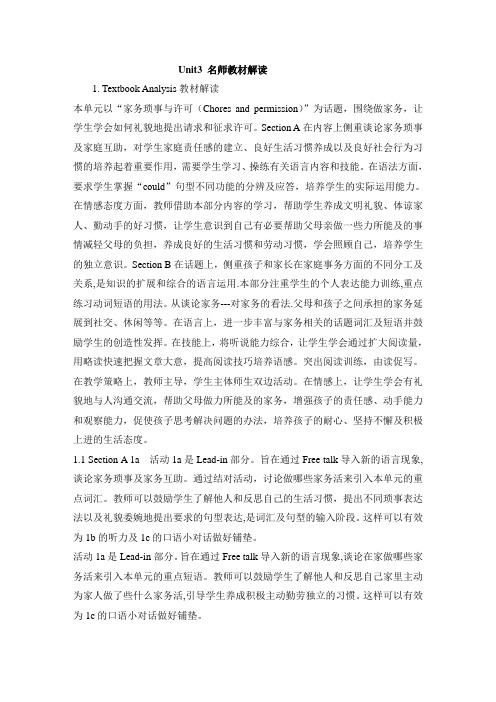
Unit3 名师教材解读1. Textbook Analysis教材解读本单元以“家务琐事与许可(Chores and permission)”为话题,围绕做家务,让学生学会如何礼貌地提出请求和征求许可。
Section A在内容上侧重谈论家务琐事及家庭互助,对学生家庭责任感的建立、良好生活习惯养成以及良好社会行为习惯的培养起着重要作用,需要学生学习、操练有关语言内容和技能。
在语法方面,要求学生掌握“could”句型不同功能的分辨及应答,培养学生的实际运用能力。
在情感态度方面,教师借助本部分内容的学习,帮助学生养成文明礼貌、体谅家人、勤动手的好习惯,让学生意识到自己有必要帮助父母亲做一些力所能及的事情减轻父母的负担,养成良好的生活习惯和劳动习惯,学会照顾自己,培养学生的独立意识。
Section B在话题上,侧重孩子和家长在家庭事务方面的不同分工及关系,是知识的扩展和综合的语言运用.本部分注重学生的个人表达能力训练,重点练习动词短语的用法。
从谈论家务---对家务的看法.父母和孩子之间承担的家务延展到社交、休闲等等。
在语言上,进一步丰富与家务相关的话题词汇及短语并鼓励学生的创造性发挥。
在技能上,将听说能力综合,让学生学会通过扩大阅读量,用略读快速把握文章大意,提高阅读技巧培养语感。
突出阅读训练,由读促写。
在教学策略上,教师主导,学生主体师生双边活动。
在情感上,让学生学会有礼貌地与人沟通交流,帮助父母做力所能及的家务,增强孩子的责任感、动手能力和观察能力,促使孩子思考解决问题的办法,培养孩子的耐心、坚持不懈及积极上进的生活态度。
1.1 Section A 1a 活动1a是Lead-in部分。
旨在通过Free talk导入新的语言现象,谈论家务琐事及家务互助。
通过结对活动,讨论做哪些家务活来引入本单元的重点词汇。
教师可以鼓励学生了解他人和反思自己的生活习惯,提出不同琐事表达法以及礼貌委婉地提出要求的句型表达,是词汇及句型的输入阶段。
(2021年整理)新牛津八年级Unit3最全知识点(自己整理)
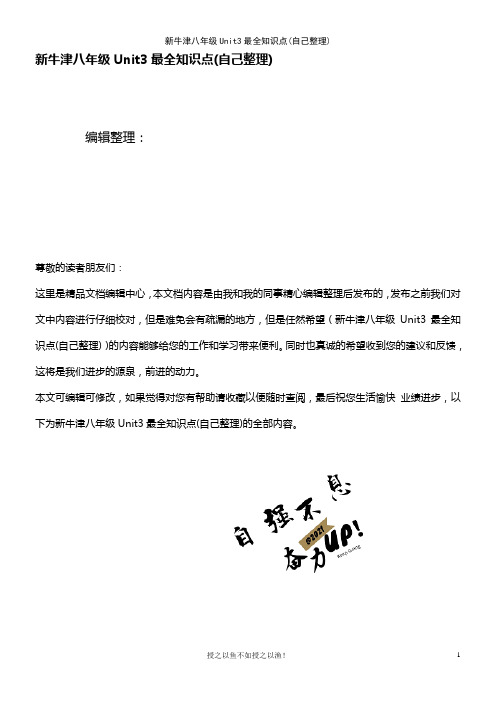
新牛津八年级Unit3最全知识点(自己整理)编辑整理:尊敬的读者朋友们:这里是精品文档编辑中心,本文档内容是由我和我的同事精心编辑整理后发布的,发布之前我们对文中内容进行仔细校对,但是难免会有疏漏的地方,但是任然希望(新牛津八年级Unit3最全知识点(自己整理))的内容能够给您的工作和学习带来便利。
同时也真诚的希望收到您的建议和反馈,这将是我们进步的源泉,前进的动力。
本文可编辑可修改,如果觉得对您有帮助请收藏以便随时查阅,最后祝您生活愉快业绩进步,以下为新牛津八年级Unit3最全知识点(自己整理)的全部内容。
8A-3 A day outComic strip & Welcome to the unit 30~311。
exercise动词,“锻炼,训练” It’s good for us to exercise every day。
* exercise 可数名词,“练习,训练,体操”。
We have five math exercises to do today. My parents often do morning exercises in winter.* exercise 不可数名词,“锻炼;运动”.Exercise makes us strong and healthy。
2.need*行为动词 You need to do it now. → You don’t need to do it now。
(有人称时态变化)*情态动词(常用语否定疑问句中) needn’t do sth → You needn’t do it now.* 用于回答must问句 Must I do it now? -Yes, you must. / No, you needn’t. / No, you don’t have to.3.keep fit, keep healthy, stay healthy保持健康4.This hill isn’t as high as a real one.* as。
人教版八年级英语UNIT3(课件 全)
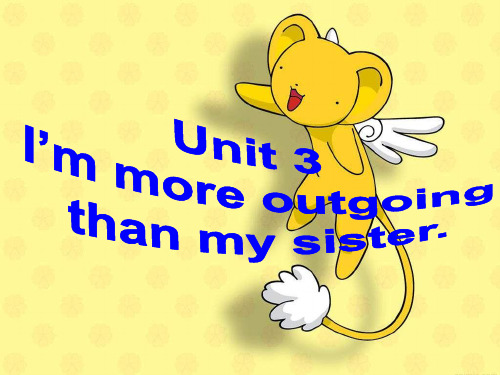
*
Is Tom funnier than Sam?
No, he isn’t. Sam is funnier than Tom.
Is Sam more hard-working than Tom?
Yes. He’s more hard-working than Tom.
2d Role-play the conversation
2a
funny friendly outgoing
Listen. Are the words in the box used with –(i)er or more? Complete the chart. (run) fast
(jump) high (work) hard
hard-working smart
• My friend David is more hard-working than me, but I am funnier than him.
• My friend ( Chen** ) is (smarter) than me , but I am ( more outgoing) than ( him/her )
.
• ⑵than 后面接代词时,一般要用主格,但在 口语中也可以换成宾格。
• eg: He is good at math than I (me). • 他比我更擅长数学。 (3)“比较级+and+比较级”表示
“越来越…” eg:In spring,the days are getting longer and longer. 春天,日子越来越长了。 She is more and more athletic . 她越来越健壮了。
1e Talk about Molly and Mary and their best friends.
八年级初二英语unit3知识点

八年级初二英语unit3知识点八年级初二英语Unit 3知识点
Unit 3是八年级初二英语课程中的一个重要部分,它包含了许多必须掌握的知识点。
以下是Unit 3中的主要知识点:
一、词汇
本单元的词汇是学生需要重点掌握的。
包括名词,动词,形容词和副词等各种类型的单词。
这些单词可以通过做语法练习来巩固记忆。
二、时态
本单元主要介绍了一些简单的时态,包括现在时,过去时和将来时等。
在英语语法中,时态是非常重要的,因此学生必须掌握这部分内容。
三、句型
本单元主要介绍了一些基本的英语句型,例如祈使句,疑问句等。
学生需要掌握这些句型,并且在实际使用中熟练运用。
四、语法
本单元主要介绍了几种基本的语法规则,包括名词性从句,简单句,复合句等。
语法规则是英语学习的重点,因此学生需要认真学习这部分内容。
五、阅读
阅读是学习任何语言都必须掌握的技能之一。
本单元提供了一些适合初学者阅读的材料,学生需要通过阅读来提高自己的英语水平。
六、写作
本单元还包括一些写作练习,例如写作话题和写作明信片等。
这些练习是帮助学生提高编写英语文章的能力,并通过书写来加深对词汇和语法的理解。
综上所述,Unit 3是八年级初二英语学习的重要部分,它包含了许多必须掌握的知识点。
学生需要耐心学习并反复练习,以便更好地掌握这些知识点并提高自己的英语水平。
初中八年级英语Unit3 教案+说课稿 人教新目标版
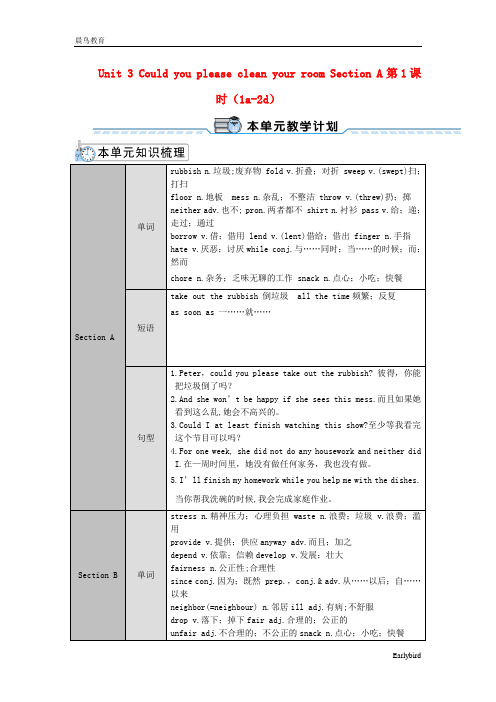
Unit 3 Could you please clean your room Section A第1课时(1a-2d)Section A单词rubbish n.垃圾;废弃物 fold v.折叠;对折 sweep v.(swept)扫;打扫floor n.地板 mess n.杂乱;不整洁 throw v.(threw)扔;掷neither adv.也不; pron.两者都不 shirt n.衬衫 pass v.给;递;走过;通过borrow v.借;借用 lend v.(lent)借给;借出 finger n.手指hate v.厌恶;讨厌while conj.与……同时;当……的时候;而;然而chore n.杂务;乏味无聊的工作 snack n.点心;小吃;快餐短语take out the rubbish 倒垃圾 all the time频繁;反复as soon as 一……就……句型1.Peter,could you please take out the rubbish? 彼得,你能把垃圾倒了吗?2.And she won’t be happy if she sees this mess.而且如果她看到这么乱,她会不高兴的。
3.Could I at least finish watching this show?至少等我看完这个节目可以吗?4.For one week, she did not do any housework and neither didI.在—周时间里,她没有做任何家务,我也没有做。
5.I’ll finish my homework while you help me with the dishes.当你帮我洗碗的时候,我会完成家庭作业。
Section B 单词stress n.精神压力;心理负担waste n.浪费;垃圾 v.浪费;滥用provide v.提供;供应anyway adv.而且;加之depend v.依靠;信赖develop v.发展;壮大fairness n.公正性;合理性since conj.因为;既然 prep.,conj.& adv.从……以后;自……以来neighbor(=neighbour) n.邻居ill adj.有病;不舒服drop v.落下;掉下fair adj.合理的;公正的unfair adj.不合理的;不公正的snack n.点心;小吃;快餐independence n.独立independent adj.独立的;自主的短语in order to目的是;为了 depend on 依靠;信赖a waste of time浪费时间 take care of 照顾;处理句型1.Could I invite my friends to a party? 我能邀请我的朋友们参加聚会吗?2.They should spend their time on schoolwork in order to getgood grades and get into a good university.为了取得好成绩并考入一所好大学,他们应该把时间花在学业上。
人教版八年级上unit3 形容词、副词比较级和最高级

easy————
badly ______
hard-working————
far____
serious————
quickly_____
big————
happy_____
thin————
sad_______
fantastic————
loud————
loudly————
(二) 用所给词的适当形式填空: 1.My home is ( far )_____ than _____( you ). 2.Bill is _____ ( heavy ) than Tom. 3.Which do you like _____ ( good )? 4.Nobody is_____ ( smart) than Li Tian in class. 5.The elephant is _____ (big ) than the horse. 6.Mr. Smith is much _____ ( old ) than his wife. 7.She is _____ ( healthy ) than her brother. 8.The car goes_____ ( fast ) than the bike.
注意:
1.比较的时候需要留意,必须是同类事物 相比较。
My hair is longer than his hair.(不能用 he)
I am taller than him.(不能用his)
2.比较的时候需要注意,than 后用人称代 词的宾格。eg:
Jack is more outgoing than me.(不能 用I,但是可以用I am)
比较级用法总结(常考六种):
1)最基础的比较级,A+动词+比较级+than B,意思是,“A比
八年级上册Unit3 考点

八年级上册Unit3 考点.outgoing/' aʊtɡəʊɪŋ/ adj. 爱交际的;友好的;外向的eg:His sister is an outgoing girl.他妹妹是一个外向的女孩。
1)outgoing的比较级为more outgoing。
多音节和部分双音节形容词和副词前加more(更)或less(不如)构成比较级。
less outgoing不怎么外向。
2)反义词:shy害羞的quiet文静的.both /bəʊθ/ adj.& pron. 两个;两个都1) both的词性及用法adj. 置于所修饰的名词前Both students like English.两个学生都喜欢英语。
pron. both of...Both of them are Chinese.他俩都是中国人。
例题:Jiefangbei is not far from Chaotianmen. You can easily visit ________ in a day.A.each B.noneC.both D.neither[辨析]both与allboth 两者都Both plans are good.两个计划都很好。
all 三者或三者以上都All teachers like to go there.所有的老师都喜欢去那儿。
例题:My hometown is becoming more and more beautiful with trees and flowers on________ sides of the road.A.all B.bothC.neither D.eitherboth...and... ……和……两者都连接名词Both New York and London have traffic problems.纽约和伦敦都存在交通问题。
连接代词Both she and I are good at English.我和她都擅长英语。
- 1、下载文档前请自行甄别文档内容的完整性,平台不提供额外的编辑、内容补充、找答案等附加服务。
- 2、"仅部分预览"的文档,不可在线预览部分如存在完整性等问题,可反馈申请退款(可完整预览的文档不适用该条件!)。
- 3、如文档侵犯您的权益,请联系客服反馈,我们会尽快为您处理(人工客服工作时间:9:00-18:30)。
go fishing去钓鱼
go bike riding去骑车
go swimming去游泳
6. Send me a postcard from Hong Kong!从香港给我寄张明信片来!
⑴send过去式:sent
⑵send sth from sp.从某地寄某物来
Please don’t forget to close the door when you leave.你离开时,请别忘记关门。
I forgot visiting my grandparents last weekend.我忘了我上周末已经看望过我祖父母了。
14. I can’t wait.我等不及了。
教师
张楠
学生
时间和课时段
2013年月日
(:—:)
学科
英语
年级
八年级
教材名称
人教版
授课题目
What are you doing for vacation?
课次
第三次
教学目标
掌握新单词
教学重点
重点词汇、句型讲解
教学难点
相关词汇扩展
教学过程
一、情景导入:
上节课学习了如何看医生,大家都掌握得差不多了吧?今天我们放松一下,来谈论一下我们的假期活动有哪些。
( A )2. I had wanted to go to England for vacation, but at last I decidedCanada.
A. on B. over C. in D. about
( A)3.-- I’m sorry I forgotthe letter for you!
She finished cleaning the room.她打扫完房间了。
随堂训练:
单项选择:
( D )1. What are we doing on Sunday?” “ How about?
A. to go bike riding B. going bike to ride C. going to bike riding D. going bike riding
⑵leave sth+地点把某物落在某地
I left my bag in the train.我把我的包落在火车里了。
13. I hope I can forget all my problems.我希望我能忘掉所有的烦恼。
⑴forget to do sth.忘记要做某事
⑵forget doing sth.忘记已经做过某事
( D )9. I think walking is________ our health.
A. good at B. bad at C. well in D. good for
( C )10. -My mother is ill. -________
A. Don't worry. B. No hurry. C. I'm sorry to hear that. D. OK.
10. He thought about going to Greece or Spain, but decided on Canada.他想过去希腊或西班牙,但却决定去加拿大。
⑴think about doing sth.考虑做某事
⑵decide to do sth.决定做某事
decide on doing sth.
( C )5.They decidedto the mountain.
A. hiking B. on hike C. to hike D. not hiking
( C )6.She looksbecause she has avacation.
A. relaxed , relaxed B. relaxing ,relaxing C. relaxed, relaxing D. relaxing ,relaxed,
学生到校,上课纪律
教师意见
家长意见
学管教师
3. I’m going to Tibet for a week.我要去西藏一个星期。
For+一段时间,用来回答由how long引导的疑问句。
How long did you walk?你们走了多长时间?
We walked for two hours.我们走了两个小时。
4. That sounds interesting.那听起来有趣。
sound为连系动词,意思是“听起来”。系动词用于说明主语的性质、状态和身份。
常见的还有feel, keep, stay, look, get等。
My aunt looks very young.我的阿姨看起来很年轻。
5. I am going hiking in the mountains.我要在山区里远足。
⑶send sb sth.= send sth to sb.把某物寄给某人
⑷send for派人去请
Send for a doctor, your mother is ill.去请大夫,你的妈妈病了。
7. Show me you photos when we get back to school.当我们返回学校时,你把照片拿给我看。
二、知识点罗列:
1.What are you doing for vacation?假期你要做什么?
I’m babysitting my sister.我要照顾我的妹妹。
⑴该句用的be + V–ing是现在进行时的形式,但用于表示将来。
⑵babysit过去:babysat.进行时:babysitting
⑴show sb sth= show sth. to sb.
⑵get back =come backБайду номын сангаас来
8. Where are you going for vacation?你要去哪度假?
I’m going to Hawaii for vacation in December, and I’m staying for three weeks.我要在12月去夏威夷度假,在那里呆3个星期。
I can’t decide what to wear.我不能决定穿什么。
11. I heard that Canada is beautiful, and I know there are many people there who speak French.
我听说加拿大很美,我还知道那儿有很多说法语的人。
( B )7. I can’t waitthe nice picture.
A. buy B. to buy C. buying D. bought
( D )8. He ________stay at home and look after his mother yesterday.
A. needed to B. must C. have to D. has to
The train is leaving.火车就要开走了。
2. Who are you going with?你要和谁一起去?
I’m going with my parents.我要和父母一起去。
When is he going camping?他要什么时候去露营?
He is going on the 12th.他要12号去。
9. Can I ask you a few questions about your vacation plans?
我可以问你一些有关你假期计划的问题吗?
⑴ask ab about sth.问某人关于某事
⑵plan名词/动词,计划
plan to do sth.计划做某事
I’m planning to spend time in the beautiful countryside.我打算在美丽的乡村度过时间。
can’t wait to do sth.迫不及待的想做某事
She can’t wait to get home to see he parents.她迫不及待的想回家看望父母。
15. I just finished making my last movie.我刚拍完上一部电影。
finish doing sth.做完某事
hear侧重指听的结果
listen侧重指听的动作
12. He is leaving the first week in June and staying until September.
他将在6月的第一个星期动身,一直呆到9月。
⑴leave for去往某地
She is leaving for Hong Kong on Tuesday.他要在周二去香港。
-- It doesn’t matter(没关系), I’ll post it myself.
A. to post B. posting C. post D. posted
( C )4. We all foundto play the game.
A. that interested B. this interesting C. it interesting D. it’s interesting
